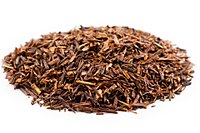
Photo from wikipedia
The present study was carried out to determine (1) essential minerals, total polyphenols, total flavonoids, moisture and ash of four selected South African herbal teas and (2) the effect of… Click to show full abstract
The present study was carried out to determine (1) essential minerals, total polyphenols, total flavonoids, moisture and ash of four selected South African herbal teas and (2) the effect of blending bush tea with other known commercial herbal teas.,The method used to determine moisture and ash contents followed that of the Association of Official Analytical Chemists (AOAC). Nine minerals were analyzed using inductively coupled plasma optical emission spectrometry (ICP-OES). The total phenolic and flavonoid contents were determined by Folin–Ciocalteu assay and aluminum chloride colorimetric assay, respectively.,The results of the study demonstrated that bush tea had a high ash content of 8.01% and special tea (9.23%), while honeybush (1.96%) and rooibos tea (2.17%) exhibited a low ash percentage. The mineral content was higher in bush tea and special tea than in rooibos tea and honeybush tea except for sodium, which was higher in rooibos tea. The blending of bush tea with special tea improved its potassium content from 22,937.00 mg/kg to 23,379.20 mg/kg. Blending bush tea with rooibos tea at a ratio of 25:75 increased the flavonoid content to 12.21 µg/mL.,The results of the nutrients composition cannot be generalized as it is influenced by other factors such as soil type and seasons.,Increasing the commercialization of indigenous teas.,The results of the study suggest that bush tea and special tea are nutritionally comparable with South African commercial herbal teas. Thus, the consideration for commercialization of these teas is crucial.
Journal Title: British Food Journal
Year Published: 2020
Link to full text (if available)
Share on Social Media: Sign Up to like & get
recommendations!